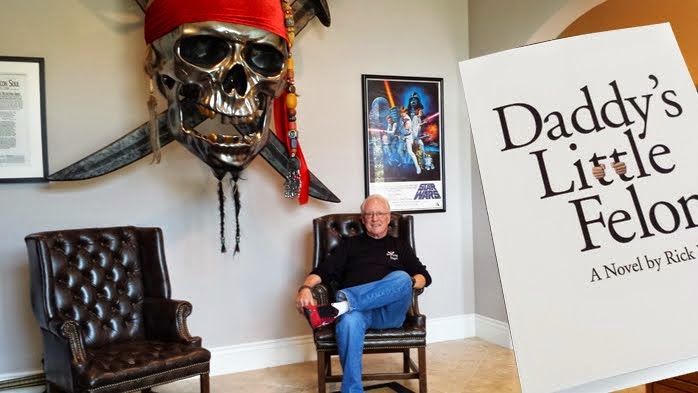Tom West, friend and genius—immortalized in Tracy Kidders Pulitzer prize winning book
Soul of a New Machine
—died on May 19th. Tom and his team literally saved Data General back in the early 1980s by creating the MV/8000. I met Tom in 1979 after losing my race for Congress in the state of Washington. I sold my company to pay for the campaign, and needed work. Impressed with the ads I wrote and the publicity I garnered for my voice stress analyzer invention, Data General hired me to lead advertising and PR efforts for this breakthrough technology designed to go head to head with Digital Equipment Corporation's VAX. Interestingly, the marketing director with whom I worked was Ed Zander, who later became president of Sun Microsystems and then eventually CEO of Motorola. But this story is about Tom West.
West and I became immediate friends, as I was really a mathematician/engineer who got into advertising because I liked intellectual "vertical integration" (something that later endeared me to
Larry Ellison
). I used to roam the bat caves of Data General late at night, chatting up engineers on the real technical challenges of knocking off Digital's VAX. Actually, the best source of advertising metaphors I've seen then or thereafter were the comments put into operating system source code. Yeah, they let me look at source code.
This story has never been reported, anywhere. So enjoy yourselves:
The title of today's epistle calls Tom West a "righteous hacker friend." That's because of one of our midnight adventures back in 1980 Massachusetts (Ye gads, thirty-one years ago!). One of my shooting-the-breeze conversations with Tom concerned the MV/8000's ring security system and cacheing mechanism as it compared to the much less-robust VAX design. I said, "Heck, that would seem easy enough to verify and exploit. Why don't we get some time on a VAX and test this little code snippet?"
Tom's eyes lit up and he said, "I have a buddy at the [unnamed university] computer science lab. I'll bet he'd give us half an hour on their VAX at 2:00 AM sometime soon." And sure enough, Tom's friend let us pay the VAX an oh-dark-thirty visit the very next week. It only took twenty-five minutes for us to drop in the code, execute it, and verify that the VAX indeed had a gigantic hole. An architectural hole, if you will.
I contend Tom West was a "righteous hacker" because companies like DEC and Data General hadn't yet dreamed up all the contractual tricks later used by Oracle and Siebel. We didn't violate any contracts signed by DEC's university customer. We just ran some code. We probably couldn't do that today. Oracle still has a no-benchmark clause in their contracts. And Siebel used to have a you-can't-say-anything-bad-about-us clause in their agreement. Your recourse with Siebel was to get your money back, which is why Siebel could get away with their "100% customer satisfaction" advertising slogan. Unsatisfied customers were made ex-customers. Simple. Effective. Period.
To Tom West's credit, he never used this VAX flaw against them. Neither did I. Because if they fixed it, they could do a lot better on benchmarks against the MV/8000. We satisfied ourselves with the success of Data General in the marketplace. I did, however, learn the value of market momentum. Digital Equipment Corporation created a whole new Data General just from their annual earnings each year. Eventually, Data General lost the R&D war and went away. Of course, later so did Digital. I took the momentum lesson with me when I moved to Silicon Valley and started my ad agency. One of my first customers was Oracle's Larry Ellison, and you'll agree we played the momentum game in spades.
Two headlines this week caused me to reflect on Tom West and his legacy. The first story posted on May 24th reported over 400,000 email addresses were discovered on hard drives of
confiscated Rustock servers. The second story came out today, reporting that
5% of all Windows PCs are infected with some kind of virus. You might be asking about now, "What does a 31-year-old VAX architectural flaw have to do with infections of Microsoft hardware today?" My answer is that Microsoft's architectural flaws today were born with the VAX. You see, a fellow named Dave Cutler was one of the software engineers on the operating system that would power the VAX 11/780. He would later lead Microsoft's development of Windows NT. And propagate the same idiotic operating system philosophy. And DECnet became TCP/IP, the biggest single hole in today's Internet architecture. There are a lot of etceteras in this chain of stupidity, and they're being exploited daily by Russian cyber criminals and
China's Blue Army.
So my reflections this week are more asking, "What if?" What if Tom West's hardware and software genius had made today's PCs and operating systems more MV/8000-like than VAX-like? What if the BEST architecture had won, rather than the one with the overwhelming market momentum? Fighting the mini-computer wars of the 1970s was a lot like religion, and the PDP-11 instruction set was just a lot more elegant than Data General's. Data General didn't find 32-bit religion until it was too late. Kind of like the religious council held in 325 A.D. Nicaea. The victors didn't prevail because they were right, but because they had swords at everyone's throats.
Today's world conflicts are nothing more than the same religious wars that have been going on for thousands of years. Today's computer security hiccups are the result of bad ideas prevailing over good ones.
Rest in peace, Tom. While we're still fighting the cyber wars, a lot of your religious questions have probably been answered by now.



